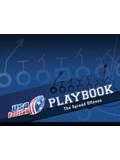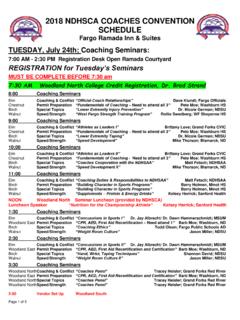Transcription of THE COACH’S WHITEBOARD - South Metro Junior Football …
1 THE coach S WHITEBOARDL evel 1 on-line Youth & Senior coaching CourseNAME:CLUB:PHONE:2/30 OVERVIEW: THE coach S WHITEBOARD To complement your online learning, you are required to complete this workbook at various intervals throughout the course. This workbook is called The coach s WHITEBOARD and serves as your personalised game plan for becoming an Australian Football coach . The coach s WHITEBOARD aims to capture your ideas and action points in a tangible resource to accompany you on your learning journey. It also acts as a reference tool to help you complete the other requirements of the accreditation program. To successfully complete the accreditation, you will need to hand in your completed copy of The coach s WHITEBOARD for sign-off at the end of the one day coaching coach s WHITEBOARD may be used for mentoring purposes and for self-reflection and development.
2 It is also required for some of the activities at the one day coaching workshop and for assessment for your accreditation. So be as specific as you can and always include action items for your development WILL BE REQUIRED TO COMPLETE ACTIVITIES IN THE coach S WHITEBOARD AS YOU PROGRESS THROUGH THE ONLINE print a copy now. 3/30 ACTIVITY 1 DEVELOPING YOUR coaching PHILOSOPHYPART 1: SOME FUNDAMENTAL QUESTIONSWhat are your reasons for coaching ? _____ _____ _____What do you believe and value about the coaching process? _____ _____ _____Why do you believe your players are participating in the game? _____ _____ _____How does your team/club wish to be perceived in the league? _____ _____ _____4/30 PART 2: FIRST STEPS IN WRITING OUT YOUR coaching PHILOSOPHYW rite down one or two sentences under each heading which describes your approach to each of the topics listed.
3 You might be guided by question such as: What does this area of coaching mean to you? How would you approach this area? What behaviour would you demonstrate how would others observing see you?Your coaching role(What are the main on and off field roles you will be carrying out?) _____ _____ _____Coaching style _____ _____ _____Communication style _____ _____ _____Role of assistant coaches _____ _____ _____Fitness _____ _____ _____Player discipline _____ _____ _____Developing club culture _____ _____ _____5/30 Team selection _____ _____ _____Development of game plan and team rules _____ _____ _____Player responsibility _____ _____ _____Relationship with umpires _____ _____ _____6/30 ACTIVITY 2 YOUR coaching STYLEAs you have seen, there are distinct categories of coaching styles. There is however no one perfect style that leads to coaching success.
4 Understanding your own preferred style and its strengths and weaknesses is important in developing a successful coaching general, what is your preferred coaching style? _____ _____ _____ _____ _____ _____ _____ _____ _____Taking into account the age and characteristics of your team and your own personality, how do you believe you will adapt your style to coaching the team? _____ _____ _____ _____ _____ _____ _____ _____ _____7/30 ACTIVITY 3 YOU AND THE UMPIRES (Your role in determining the match day environment)Complete the following assessment that will provide a guide as to your behavior towards answers to these questions will give you an indication of how you behave toward a coach , you are an influential role model and your players will more often than not emulate your may wish to consider your responses to these questions in light of the AFL Coaches Code of Conduct.
5 Do your responses align with the major thrust of the Coaches Code? You may wish to make changes to your attitude towards umpires and make changes to your behaviour. 1. KNOWLEDGE OF THE LAWS Do you read the law book? Do you encourage your players to read the laws book? Are you familiar with the spirit of the laws ? Do you discuss the spirit of the laws with your players? Do you invite umpires to training to assist in developing a better understanding of the laws?Do you raise your concerns with the umpires coach ? Do you actively teach and encourage players to play within the laws?YES NO8/302. AT THE MATCH Are umpires made welcome by your club? Do you seek input as to how your club looks after umpires?
6 Does your club appoint someone to look after umpires?Does your club provide escorts for the umpires leaving the ground at half-time and after the match?Do you welcome the umpires when they visit your rooms before the match?3. DURING THE MATCHDo you shout at the umpires? Do you shout comments about decisions in earshot of your players or the umpires?Do you refer to the umpires when you address your players?Do you refer to the umpires so they can hear you during your address to the players?Do you permit your players to dispute decisions or back-chat umpires?4. AFTER THE MATCH Does your club look after the umpires after the match? Do you discuss the match with the umpires? Do you tend to ignore the umpires after the match? Do you encourage your players to talk to the umpires socially?
7 YES NOYES NOYES NO9/30 ACTIVITY 4 GAME SENSE AND DECISION-MAKING TRAINING Game sense is an approach to coaching that uses games as the focus of the training session. Using the following template, design a game which you would use for practicing a specific element of the game. Be prepared to introduce and demonstrate your practice game to other participants at the facilitated one day coaching SENSE PRACTICE ACTIVITYName of game: _____Themes: What are the elements of play you are developing by using this game? _____ _____ _____Equipment: _____ _____ _____Key player roles: _____ _____ _____Main rules/instructions:1. _____ _____ 2. _____ _____ 3. _____ _____ 4. _____ _____10/30 Activity diagram11/30 Initial facilitation questions(For the coach to ask players to develop their game sense activity) 1.
8 _____ _____ _____ 2. _____ _____ _____ 3. _____ _____ _____12/30 ACTIVITY 5 RISK MANAGEMENTPART 1: A coach S LEGAL the article below explaining a coach s duty of care to their players and answer the questions following the article coaching : A LEGAL (& SAFETY) RESPONSIBILITYBy accepting a coaching position, you have made a legal commitment to your players and their safety. You have: Indicated you possess coaching and other related skills. Indicated you will maintain your skills at a level equivalent to the skills of other competent coaches in your injury in sport is inevitable, and although coaches have a legal responsibility for the safety of their players, it should not assume such intimidating proportions that they give coaching away, or unduly restrict programs to the point where players needs are not being REQUIREMENTSN egligenceNegligence is the failure to take reasonable precautions to avoid reasonably foreseeable injury to persons or property.
9 In the coaching environment, negligence will arise where: 1. The coach has a duty of care to an athlete; 2. The coach breaches that duty of care by doing or failing to do something which would reasonably have been foreseen to put the athlete at risk of loss; 3. The breach ( act or omission of the coach ) ultimately causes harm or damage to the athlete; and 4. The harm or damage suffered by the athlete is financial and/or physical in Duty of careA coach will have a duty of care to any athlete that he or she is coaching and this duty of care will exist at training sessions, during matches and on other occasions where a coach would be reasonably expected to provide such care to an BreachIn determining whether a coach has breached his or her duty of care, a court will consider whether the coach has done, or failed to do, something that a reasonable and prudent coach would have done to prevent harm to an athlete (ie has the coach provided an appropriate standard of care).
10 A reasonable and prudent coach provides a standard of care based on what should be known about the sport and/or the injury. Ignorance is no excuse. Most legal cases involving sports injuries arise not because a coach was careless, but because they failed to act in accordance with what knowledge they had or should have coach will not be in breach of their duty of care if they: take all necessary precautions to prevent reasonably foreseeable injuries from occurring; avoid doing, or failing to do, anything that could reasonably cause injury; respond to and treat injuries appropriately when they occur; and ensure the treatment provided prevents further CausationThe act or omission by a coach must be the main cause of the harm or damage experienced by an athlete ( had the act or omission not occurred, no harm or damage would have been suffered).






